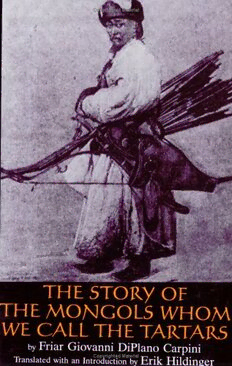Download The story of the Mongols whom we call the Tartars PDF Free - Full Version
Download The story of the Mongols whom we call the Tartars by Da Pian Del Carpine Giovanni, Erik Hildinger in PDF format completely FREE. No registration required, no payment needed. Get instant access to this valuable resource on PDFdrive.to!
About The story of the Mongols whom we call the Tartars
История монголов, коих мы знаем как татар"16 апреля 1245 г. итальянский монах-францисканец Джованни да Плано Карпиньи отправился из Лиона в Монголию в ставку великого хана по поручению папы Иннокентия IV как глава дипломатической миссии. В Бреслау (ныне Вроцлав) к ним присоединился еще один монах — Бенедикт — в качестве переводчика. Ступив в Канев, они достигли границ монгольских владений и через год в низовьях Волги прибыли в ставку Батыя, покорителя Восточной Европы. Батый направил их дальше к верховному хану. Путешествие проходило вдоль берегов Аральского моря, по долине Сыр-Ларьи к Семиречью и вдоль склонов Монгольского Алтая. Прибыв на место, посланцы папы узнали, что великий хан Угедей уже четыре с половиной года как скончался и со всех концов огромной Монгольской империи все это время созывают потомков Чингисхана для избрания нового хана. Монахи присутствовали во время избрания великим ханом старшего сына Угедея Гаюка в августе и лишь после этого были представлены ему. Их продержали в Орде до ноября и отпустили с наступлением зимы, вручив послание папе на монгольском, арабском и латинском языках, в котором просто утверждалась роль хана как исполнителя кары божьей. Когда летом следующего года они вновь добрались до Киева, славяне-христиане встречали их как восставших из мертвых. Прибыв в Лион, Карпини передал папе врученное ханом послание, а сам вскоре стал архиепископом и написал историю своего путешествия, которая полностью вышла в свет лишь в 1839.P.S. Данная публикация осуществлена в рамках программы "Возрождение ссылок" :)
Detailed Information
| Author: | Da Pian Del Carpine Giovanni, Erik Hildinger |
|---|---|
| Publication Year: | 1996 |
| ISBN: | 828320179 |
| Pages: | 70 |
| Language: | English |
| File Size: | 6.459 |
| Format: | |
| Price: | FREE |
Safe & Secure Download - No registration required
Why Choose PDFdrive for Your Free The story of the Mongols whom we call the Tartars Download?
- 100% Free: No hidden fees or subscriptions required for one book every day.
- No Registration: Immediate access is available without creating accounts for one book every day.
- Safe and Secure: Clean downloads without malware or viruses
- Multiple Formats: PDF, MOBI, Mpub,... optimized for all devices
- Educational Resource: Supporting knowledge sharing and learning
Frequently Asked Questions
Is it really free to download The story of the Mongols whom we call the Tartars PDF?
Yes, on https://PDFdrive.to you can download The story of the Mongols whom we call the Tartars by Da Pian Del Carpine Giovanni, Erik Hildinger completely free. We don't require any payment, subscription, or registration to access this PDF file. For 3 books every day.
How can I read The story of the Mongols whom we call the Tartars on my mobile device?
After downloading The story of the Mongols whom we call the Tartars PDF, you can open it with any PDF reader app on your phone or tablet. We recommend using Adobe Acrobat Reader, Apple Books, or Google Play Books for the best reading experience.
Is this the full version of The story of the Mongols whom we call the Tartars?
Yes, this is the complete PDF version of The story of the Mongols whom we call the Tartars by Da Pian Del Carpine Giovanni, Erik Hildinger. You will be able to read the entire content as in the printed version without missing any pages.
Is it legal to download The story of the Mongols whom we call the Tartars PDF for free?
https://PDFdrive.to provides links to free educational resources available online. We do not store any files on our servers. Please be aware of copyright laws in your country before downloading.
The materials shared are intended for research, educational, and personal use in accordance with fair use principles.

